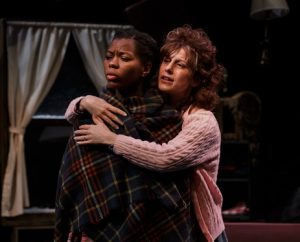UCSD’s tragic, intense ‘A Lie of the Mind’ revisits ‘The Twilight Zone’
There’s a right way and a wrong way to fold the American flag, Baylor declares in his craggy “or else” screed—you tuck it into a triangle so the stars are all that show, and whatever you do, do not let the fabric touch the ground. Baylor and his little fusspot wife Meg run through the whole thing near the end of Sam Shepard’s A Lie of the Mind, the current entry from UCSD’s Department of Theatre and Dance; the joy at their sense of accomplishment fuels the kiss Baylor plants on Meg (their first smooch, she observes, in probably 20 years, although Baylor has his doubts).
Truth be told, there isn’t a lot to kiss about in this gritty tale of spousal abuse and the worst it brings out in the families involved. The humor is stark and almost taciturn; the nostalgia is founded in fractured, bitter relationships, an arson that claims a whole house and a fierce blizzard that traps the families’ rage and fear. The flag (draped around one character for part of the show) weaves in and out of director and department chair Charlie Oates’ action, a serious reminder of Shepard’s subversive take on the national landscape.
This production looks long and deep into itself; what comes out is an ethereal, scathing indictment of American life and a freewheeling young company’s excellent portrayal.

Beth (Chaz Hodges, upper left) doesn’t let a thing like a brain-damaging beating get in the way of her love for Jake (Gerard Joseph). Photos by Jim Carmody.
Beth’s face has been beaten into a swollen, bloody meal by her insanely jealous husband Jake, who hasn’t reacted that violently since he bare-handedly took out a goat that backed over his feet by mistake. He thinks he killed Beth this time, but she’s out of the hospital, living in Montana with family—and the damage to her mind now yields oddly global takes on the people and things around her (“Look how big a man is,” she lilts as she holds up one of her lumbering dad Baylor’s shirts). Underneath her pidgin English is a trove of philosophical phrases about the nature of life and the families in question. Not bad for a beating victim who thinks somebody’s made off with her brain.
Beth’s brother Mike, aghast that his sister still loves Jake, will kill himself a share of wild game by play’s end, but not before he puts a bullet in the leg of Jake’s brother Frankie, who’s only come from California to seek peace between the families. These are among a cluster of nicely disjoined events (not the least of which include the successful flag-folding and Beth’s second “wedding”) that close the play amid lost soul Jake’s desperate, quiet search for meaning in the life he’s squandered.
Maybe—maybe—Shepard’s signature American West environs can eke out one last miracle of salvation after all. Maybe not.
This play would have made a great entry in the old Twilight Zone TV series—each family is firmly ensconced in Rod Serling’s “wondrous land whose boundaries are that of imagination.” Shepard masterfully defines that netherworld on either side, giving Beth’s family a trove of gutty, bare-bones speeches on their lousy state of affairs and painting Jake’s kin as dew-eyed, legato-voiced orators, eager to cry victimhood in their search for the things that matter. Shepard deliberately refrains from tying up the loose ends in each clan’s situation, leaving all sorts of room for our speculation on the outcomes and, by extension, our participation in the show.
Gerard Joseph knows exactly when to rein in Jake’s despair, giving way to his wonderment at the injured Beth’s innate goodness. Chaz Hodges has a good handle on Beth’s mechanics, betraying neither too much nor too little of the beating’s ill effects.

Beth (Chaz Hodges, left) can’t quite comprehend the barrage of platitudes from her befuddled mom Meg (Vi Flaten).
Luis Vega’s excitable Mike; Walker Hare’s rangy, cranky Baylor; Zakiya Iman Markland’s stoic Lorraine; Keith Wallace’s baffled Frankie; Lorena Martinez’s firebrand Sally: They congeal at will, almost as if in anticipation of Vi Flaten’s first-rate turn. She is positively precious as Meg, the long-suffering charwoman of a wife, whose chirpy naiveté is at once a reflection of the enormous neglect she’s let roll off her back. In one outstanding scene, Meg imperturbably invites Baylor to take a hike amid years of marital funk—no dare, no ultimatum, just an unbridled irony a chastened Baylor finds impossible to ignore. Absolutely. Sensational. Stuff.
Andréa Healy’s set tends toward the clichéd amid all its clutter, which almost competes with the story rather than underscores it. Michelle Hunt Souza’s costumes and Christopher Lundahl’s lights are sometimes at similar cross-purposes, but individually, both techs acquit themselves. Nods to sound designer Andy Muehlhausen for his stark music beds and the oddly appropriate Stephen Stills tunes before the show and during the breaks (I’d forgotten how long it’s been since I’ve heard “Sit Yourself Down,” an unheralded ’70s masterpiece).
Shepard sets his plays in the wide-open spaces for a reason. He apparently thinks the American West as we know it is extinct, and with it has gone the individualism and romance that once characterized the national soul. His troubled characters have wonderful stories about the days of yore buried deep within them—and with UCSD’s A Lie of the Mind, we sense that those stories have yielded to a personal impoverishment as insoluble as his people allow. Very, very good.
This review is based on the opening-night performance of Feb. 14. A Lie of the Mind runs through Feb. 23 at UCSD’s Theodore and Adele Shank Theatre, Revelle College Drive. $10-$25. 858-534-4574, theatre.ucsd.edu.

Martin Jones Westlin, principal at editorial consultancy Words Are Not Enough and La Jolla Village News editor emeritus, has been a theater critic and editor/writer for 25 of his 47 years…
More…
